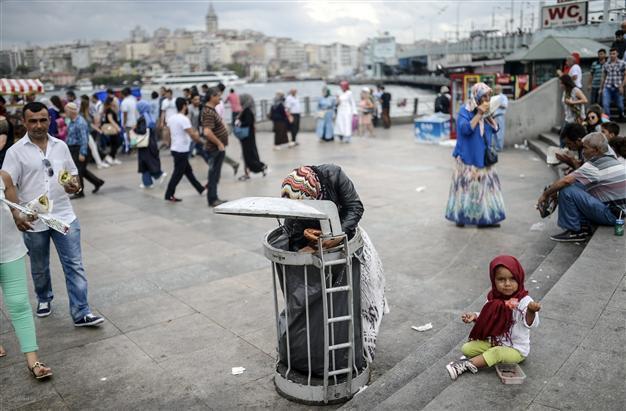Turks warming to EU as concerns related to refugee flow skyrocket: Survey
ISTANBUL

A Syrian refugee child eats food which her mother collects from rubbishbins on Aug. 18, at Eminönü in Istanbul. AFP Photo / Bülent Kılıç
Turks have grown warmer to the European Union over the past year, while concerns about refugees and the government’s migration policy have sharply soared against the backdrop of rising tensions between Syrian refugees and locals, according to the latest Transatlantic Trends survey by U.S. think tank the German Marshall Fund.The annual study shows that the EU’s approval rates have registered a slight but significant rise, after a chilly period that reached its pinnacle last year.
The proportion of the Turkish public with a positive opinion of the European bloc saw a 10 percent increase over the year, but at 45 percent remains lower than the proportion with an unfavorable opinion (51 percent). Meanwhile, the percentage of respondents who responded that accession would “benefit the country” (53 percent) topped the 50 percent threshold for the first time in many years.
Those who described their opinion about the EU as being “somewhat favorable” rose from 23 percent in 2013 to 36 percent this year, in addition to the 10 percent of respondents who said they have a “very favorable” opinion (a decline of 2 percent compared to 2013). However, the proportion of respondents with a “very unfavorable” opinion of the EU remains strong (30 percent) and is the highest among the sampled countries, including Greece, where the far-right has become a visceral political force, and Russia.
The new approval rates come after a turbulent year, when the EU has repeatedly condemned restrictive moves in terms of freedom of assembly and in the access to the Internet in Turkey. The Turkish government has attracted international uproar after blocking first Twitter and then YouTube, in the shadow of huge corruption allegations involving many top officials including President Recep Tayyip Erdoğan, who was prime minister at the time.
The survey also revealed that Turks’ positive views of NATO had seen an uptick, though the alliance remained unpopular among the majority of the population. Some 49 percent of respondents said NATO was essential to their security — a 10 percent increase from 2013.
Migration ‘serious problem’ for three out of four respondents
However, the most substantial change regarding Turkish attitudes has been toward refugees, as social tensions have started to surface in many areas where Syrians have settled over the past year. Seventy-seven percent of Turkish respondents said they were worried about refugees.
The sharp jump comes as migration becomes an issue on top of the agenda of Turkish politics for perhaps the first time ever. According to official figures, more than 1.2 million Syrian refugees have taken shelter in Turkey and over 900,000 live in urban areas, becoming an increasingly visible presence. Violent attacks on Syrian refugees have taken place with increased regularity, particularly in cities in southern and southeastern Turkey such as Adana and Gaziantep, where large numbers of refugees live.
The Turkish government, which choose at first to describe migrants as “guests” rather than asylum-seekers, has been criticized for failing to urgently adopt a legal framework to deal with such a large migration flow. Officials, meanwhile, have repeatedly called for more international help to deal with the refugees. NGOs have argued that the lack of definition of a “temporary resident status,” which would legally attribute the rights of refugees, was one of the reasons behind increasing social tensions. In the German Marshall Fund survey, 66 percent of Turks favored more restrictive refugee policies while only 21 percent said they should be more open.
Some 77 percent of respondents said they thought a majority of migrants come to seek asylum to move to a third country, while only 35 percent said they though refugees came to Turkey to work. Recent reports have shown that Turkish concerns about losing their jobs due to the influx of refugees is also on the rise.
The latest conflicts in Iraq have triggered a second wave of migration to Turkey, particularly of Yazidis who have fled the northern parts of the country following attacks from jihadists.
About 75 percent described emigration as a problem – 29 percent more than in 2013 – with 39 percent judging it a very serious problem. As a result, the perception of emigration in Turkey has reached the levels in other Southern Mediterranean countries, topped by Greece, where 95 percent of respondents see it as a problem. Greece is followed by Portugal (93 percent), Spain (87 percent), Italy (84 percent), and Poland (83 percent). The EU average is 58 percent.
Polarization
The results of the survey also highlighted the polarization in Turkish society as 47 percent of respondents said they had a favorable opinion of the government, while the exactly same proportion said they had a negative opinion. Turkish people’s perception of their own country has also become more negative, with only 45 percent saying they have a “very favorable” opinion of their nation compared to 61 percent in 2012.
Meanwhile, Turkey’s reputation has suffered abroad, particularly in Germany, the Netherlands, Spain and Britain, where the proportion of respondents saying they have a favorable opinion of the country has significantly decreased over the last two years. Only a majoritarian of Russians (54 percent) said they have a positive opinion of Turkey.
The poll, carried out in June every year, give a first concrete indication of tendencies following the massive Gezi protests and graft allegations that hit the government last year. Ten EU countries were surveyed in the study, in addition to Turkey, the U.S. and Russia.
















